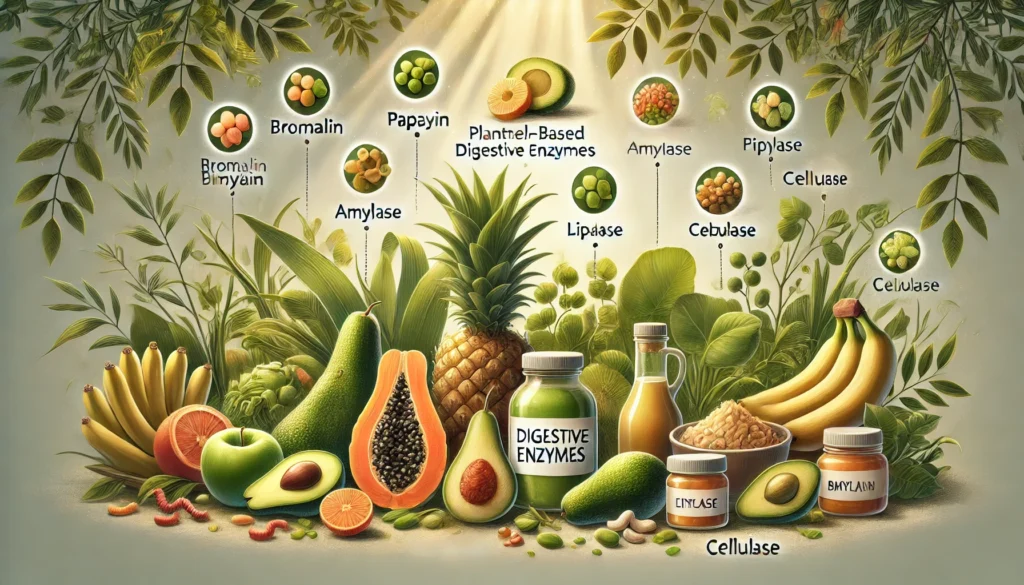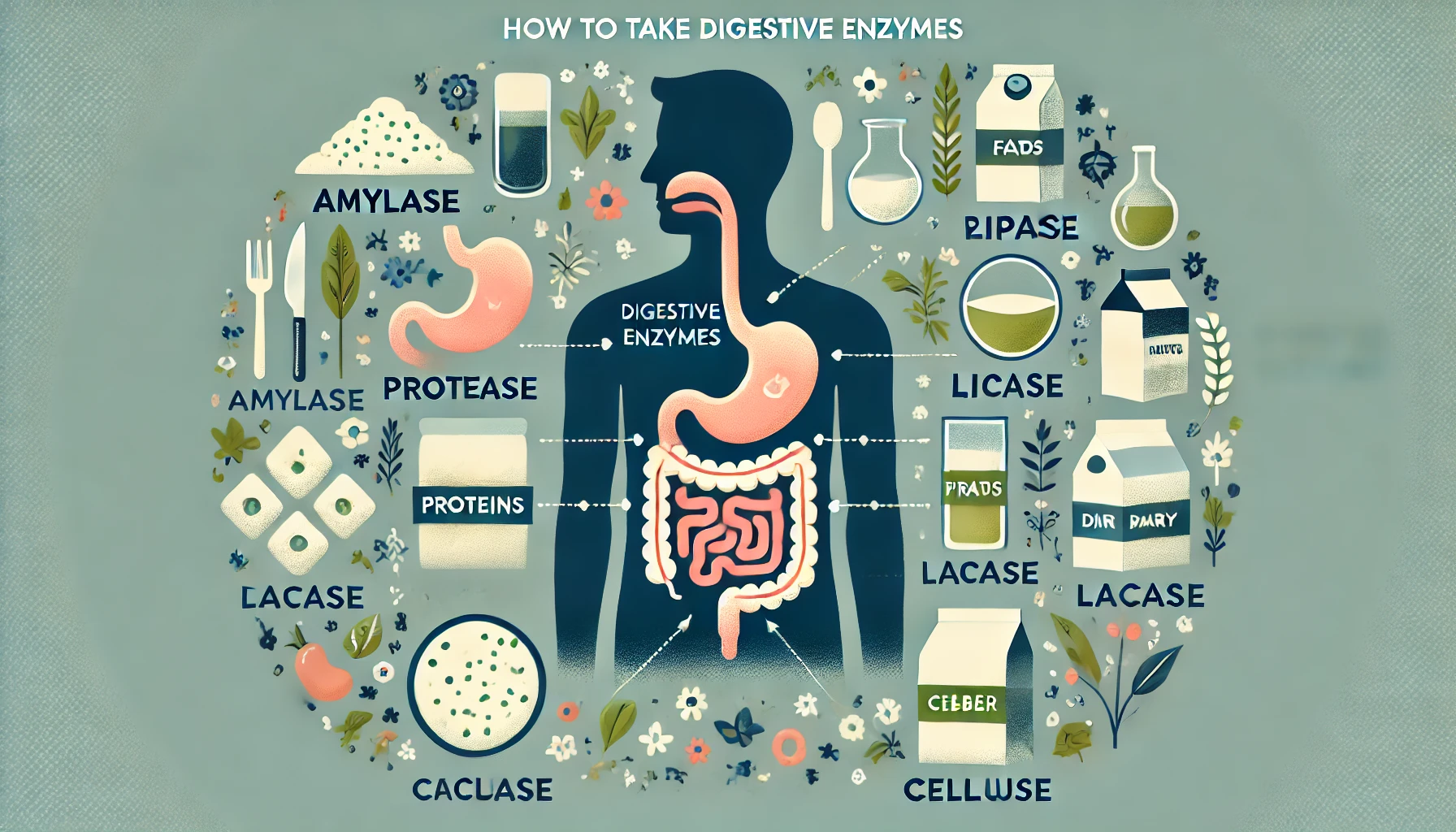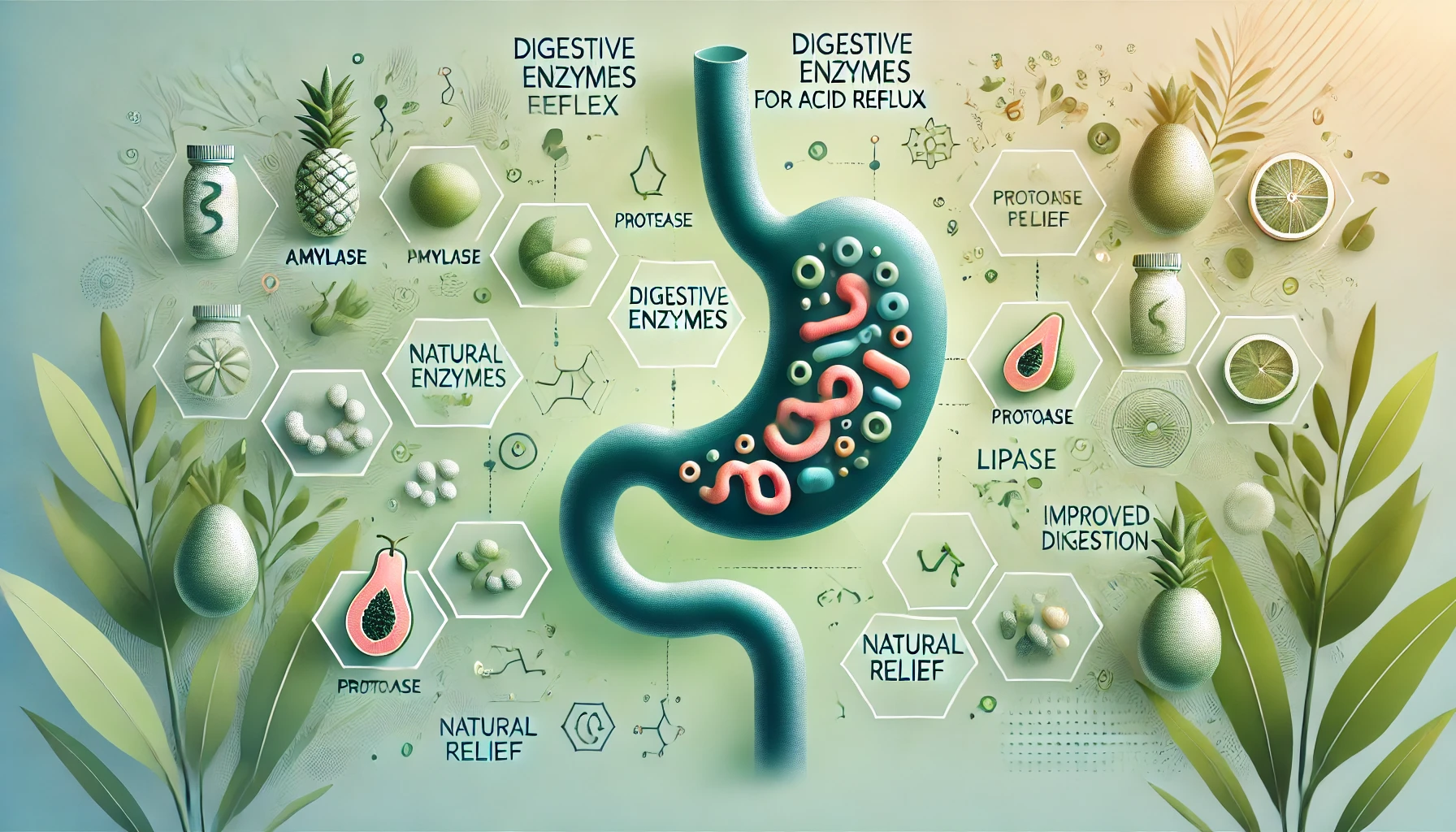Digestive enzymes play a crucial role in breaking down food and aiding nutrient absorption. Plant-based digestive enzymes are derived from fruits, vegetables, and other plant sources, offering a natural alternative to animal-based enzymes. This article explores the benefits, types, and effectiveness of plant-based digestive enzymes, providing evidence-based insights to help you make informed decisions about your digestive health.

What Are Plant-Based Digestive Enzymes?
Plant-based digestive enzymes are enzymes sourced from plants that help break down food into smaller, absorbable components. Unlike animal-derived enzymes, these enzymes are suitable for vegetarians and vegans and are often gentler on the digestive system.
Common plant-based enzymes include:
- Bromelain: Sourced from pineapples, helps digest proteins (1).
- Papain: Derived from papayas, also aids in protein digestion (2).
- Amylase: Breaks down carbohydrates and is found in various fruits and vegetables.
- Lipase: Helps digest fats, sourced from plants like avocado and oats (3).
- Cellulase: Breaks down cellulose, the fiber found in plant cell walls.
These enzymes are often combined in supplements to support overall digestion and are particularly beneficial for individuals with specific dietary restrictions or sensitivities.
Summary: Plant-based digestive enzymes come from natural sources like fruits and vegetables, providing a suitable option for vegetarians and vegans while supporting efficient digestion of proteins, carbohydrates, fats, and fiber.
Benefits of Plant-Based Digestive Enzymes
Plant-based digestive enzymes offer several benefits:
- Enhanced Digestion: By breaking down food more effectively, these enzymes help prevent digestive discomfort such as bloating, gas, and indigestion.
- Improved Nutrient Absorption: With efficient digestion, the body can absorb nutrients more effectively, promoting overall health.
- Suitable for Various Diets: As they are derived from plants, these enzymes are ideal for individuals following vegetarian, vegan, or plant-based diets.
- Gentle on the Stomach: Unlike some animal-derived enzymes, plant-based enzymes are typically less likely to cause gastrointestinal irritation.
Research has shown that plant-based enzymes like bromelain and papain not only aid digestion but also possess anti-inflammatory properties, which can be beneficial for digestive health (4) (5).
Summary: Plant-based digestive enzymes enhance digestion, improve nutrient absorption, are suitable for various diets, and are gentle on the stomach, with additional anti-inflammatory benefits.
Types of Plant-Based Digestive Enzymes and Their Functions
There are several types of plant-based digestive enzymes, each with specific functions:
- Proteases: Break down proteins into amino acids. Examples include bromelain (pineapple) and papain (papaya).
- Amylases: Convert carbohydrates into simple sugars. Found in fruits like bananas and sweet potatoes.
- Lipases: Help digest fats into fatty acids and glycerol. Plant sources include avocados and soybeans.
- Cellulases: Break down cellulose, aiding in fiber digestion. Commonly found in celery, apples, and lettuce.
These enzymes are often combined in supplements to create a comprehensive digestive aid, ensuring all macronutrients are efficiently broken down for absorption.
Summary: Different plant-based enzymes target specific food components: proteases for proteins, amylases for carbohydrates, lipases for fats, and cellulases for fiber, providing a balanced digestive support system.
Effectiveness of Plant-Based Digestive Enzymes
The effectiveness of plant-based digestive enzymes depends on the individual’s digestive health and diet. Studies have shown that these enzymes can significantly reduce symptoms of indigestion and improve overall digestive function, particularly in those with enzyme deficiencies or digestive disorders.
Additionally, plant-based enzymes have been found to retain their activity across a broader pH range than animal-derived enzymes, making them effective throughout the entire digestive tract, from the stomach to the intestines.
However, it is important to note that while these enzymes can aid digestion, they are not a cure-all for digestive issues. Their effectiveness may vary based on factors such as the type of enzyme, dosage, and individual health conditions.
Summary: Plant-based digestive enzymes are effective in reducing indigestion and improving digestion, particularly for those with specific needs, due to their wide activity range across different pH levels in the digestive tract.
Choosing the Right Plant-Based Digestive Enzyme Supplement
When selecting a plant-based digestive enzyme supplement, consider the following factors:
- Enzyme Composition: Look for a supplement that includes a blend of enzymes targeting proteins, carbohydrates, fats, and fibers.
- Source of Enzymes: Ensure the enzymes are derived from high-quality plant sources.
- Dosage and Potency: Check the potency and dosage recommendations to match your digestive needs.
- Additional Ingredients: Be cautious of added fillers, preservatives, or allergens that may not be suitable for all individuals.
Reading reviews and consulting with a healthcare professional can help you find the best supplement tailored to your needs. For more information on high-quality supplements, check out our guide on Digestive Enzyme Supplements.
Summary: When choosing a plant-based digestive enzyme supplement, consider enzyme composition, source quality, dosage, and additional ingredients to find a product that suits your digestive needs.
FAQs
Are plant-based digestive enzymes safe for everyone?
Yes, plant-based digestive enzymes are generally safe for most people. However, individuals with specific allergies or sensitivities to certain plant sources should consult a healthcare provider before use.
Can I take plant-based digestive enzymes daily?
Yes, you can take them daily, especially if you have a digestive condition that requires enzyme supplementation. It’s always best to follow the dosage instructions provided by the manufacturer or a healthcare professional.
Are there any side effects of taking plant-based digestive enzymes?
Most people do not experience side effects, but some may experience mild gastrointestinal discomfort. It’s essential to start with a lower dose to gauge your body’s response.
How do I know if I need digestive enzymes?
Symptoms such as bloating, gas, and indigestion after meals may indicate a need for digestive enzymes. However, a healthcare professional can provide a proper diagnosis and recommend suitable supplements.
The Final Note
Plant-based digestive enzymes offer a natural and effective way to support digestion, particularly for those with dietary restrictions or specific digestive concerns. They provide a gentle, versatile option to enhance digestive health and nutrient absorption. As with any supplement, it’s essential to choose high-quality products and consult with a healthcare professional to ensure they’re right for you.





